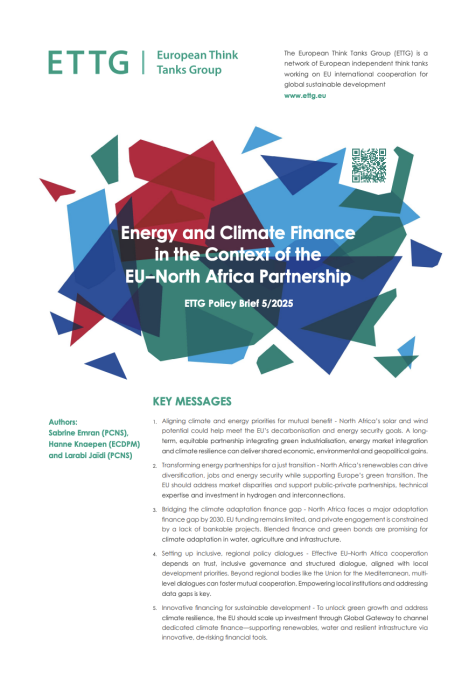This event is organized by the Green Investment Principles (GIP) Africa Chapter, co-chaired by Bank of Africa and Ninety One, in partnership with the Policy Center for the New South (PCNS). The GIP Africa Chapter, established during COP27 in Egypt, is one of the regional chapters of the GIP for the Belt and Road Initiative, a South-South collaboration aimed at bringing an emerging markets perspective to the global sustainability effort. The GIP initiative was launched in November 2019 by the City of London and Green Finance Committee of the China Society for Finance and Banking. Its membership currently includes 49 signatories, mostly large financial institutions, and over a dozen supporting organizations. Under the GIP, these member institutions, which manage over USD 42 trillion in assets, have committed to growing their green and low-carbon investments in developing countries and emerging markets, enhancing ESG risk management, improving disclosure, and adopting innovative green finance products.
RELATED CONTENT
-
AuthorsJanuary 23, 2026The post-1945 international order, an architecture born of war-weariness and colonial twilight, is now a majestic but empty shell. Its foundational promise—a universal system of rules administered impartially—has been hollowed out by decades of selective enforcement, instrumentalized law, and a chasm between the rhetorical ideals of its custodians and their geopolitical practice. This is not a temporary dysfunction, but a systemic failure of legitimacy. From the invasion of Iraq und ...
-
 AuthorsJanuary 23, 2026Introduction: COP30 as a Test of Reality, Not AmbitionCOP30 in Belém was never going to be a breakthrough. In a world marked by fiscal exhaustion, geopolitical rivalry, and eroding trust in multilateralism, expecting transformational climate cooperation bordered on denial. The choice of the Amazon as host carried symbolic weight, but symbolism does not override power, interests, or institutional capacity.The outcome of COP30 confirms a deeper truth: the global climate regime has ent ...
AuthorsJanuary 23, 2026Introduction: COP30 as a Test of Reality, Not AmbitionCOP30 in Belém was never going to be a breakthrough. In a world marked by fiscal exhaustion, geopolitical rivalry, and eroding trust in multilateralism, expecting transformational climate cooperation bordered on denial. The choice of the Amazon as host carried symbolic weight, but symbolism does not override power, interests, or institutional capacity.The outcome of COP30 confirms a deeper truth: the global climate regime has ent ... -
AuthorsJanuary 13, 2026This paper examines the nexus between governance structures, digital transformation, sustainability, and port service efficiency through an international comparative lens, with a specific focus on the Tanger Med–Algeciras corridor in the strait of Gibraltar. Using global best practices—from Singapore to Busan and Kaohsiung—it explores how public-private coordination, digital innovation, and green transition policies contribute to port competitiveness and integration into global supp ...
-
AuthorsJanuary 2, 2026Ce Policy Paper analyse les enjeux politiques, économiques et opérationnels du Fonds pour les pertes et dommages, créé pour répondre aux impacts climatiques irréversibles subis par les pays les plus vulnérables. Il clarifie d’abord la notion de pertes et dommages, qui mêle effets économiques et non économiques, et souligne les défis d’attribution liés à la superposition entre chocs climatiques et fragilités structurelles. L’analyse met ensuite en lumière les tensions d’économie poli ...
-
Jodie Keane, Helmut SorgeOctober 17, 2025Jodie Keane, Principal Research Fellow at the International Economic Development Group, discusses how green trade measures are transforming African economies, stressing the need for faire ...
-
 AuthorsHanne KnaepenJuly 1, 2025This Blog was originally published on ettg.eu Europe and North Africa are intensifying cooperation, driven by shared interests in renewable energy deployment, trade and industrialisation. This renewed focus is opening doors for deeper energy partnerships, including on green hydrogen, and offers North African countries new opportunities to expand into European markets. At the same time, it raises concerns about the uneven distribution of benefits and insufficient international f ...
AuthorsHanne KnaepenJuly 1, 2025This Blog was originally published on ettg.eu Europe and North Africa are intensifying cooperation, driven by shared interests in renewable energy deployment, trade and industrialisation. This renewed focus is opening doors for deeper energy partnerships, including on green hydrogen, and offers North African countries new opportunities to expand into European markets. At the same time, it raises concerns about the uneven distribution of benefits and insufficient international f ... -
 AuthorsJuly 1, 2025This Paper was originally published on ettg.eu KEY MESSAGES1. Aligning climate and energy priorities for mutual benefit - North Africa’s solar and wind potential could help meet the EU’s decarbonisation and energy security goals. A longterm, equitable partnership integrating green industrialisation, energy market integration and climate resilience can deliver shared economic, environmental and geopolitical gains. 2. Transforming energy partnerships for a just transition - ...
AuthorsJuly 1, 2025This Paper was originally published on ettg.eu KEY MESSAGES1. Aligning climate and energy priorities for mutual benefit - North Africa’s solar and wind potential could help meet the EU’s decarbonisation and energy security goals. A longterm, equitable partnership integrating green industrialisation, energy market integration and climate resilience can deliver shared economic, environmental and geopolitical gains. 2. Transforming energy partnerships for a just transition - ... -
AuthorsBoglarka BozsogiDecember 6, 2024Communities around the Lake Chad Basin (LCB) rely on three major economic activities: farming, fishing, and livestock herding. The floods that began in August 2024 damaged and destroyed hundreds of thousands of hectares of farmland, killed thousands of livestock, and rendered fishing unsafe for fishermen. This climate shock caused families dependent on these activities to lose their primary sources of income. Worse still, these economic activities also serve as the main source of da ...
-
AuthorsSeptember 25, 2024This paper was originally published on t20brasil.org In a global context marked by unprecedented economic and environmental challenges, Africa stands at a crossroads. The rapid rise in public debt, coupled with the climate emergency, imposes a dual constraint on the continent's countries, severely limiting their ability to pursue sustainable development and mitigate the effects of climate change. This critical situation calls for innovative and effective solutions capa ...
-
July 25, 2024This event is organized by the Green Investment Principles (GIP) Africa Chapter, co-chaired by Bank of Africa and Ninety One, in partnership with the Policy Center for the New South (PCNS). The GIP Africa Chapter, established during COP27 in Egypt, is one of the regional chapters of the...








